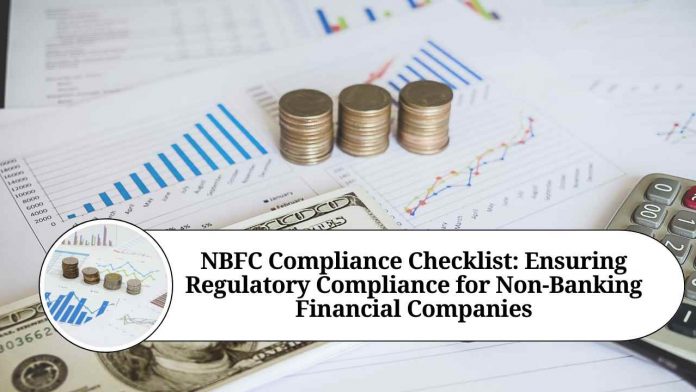Introduction
Non-Banking Financial Companies (NBFCs) play a vital role in the financial ecosystem by providing various financial services and products to individuals and businesses. However, operating as an NBFC requires strict adherence to regulatory guidelines to maintain financial stability, protect investors, and mitigate systemic risks. To ensure compliance, NBFCs must have a comprehensive checklist in place to navigate the complex web of regulations. In this blog post, we will discuss the essential compliance checklist for NBFCs to help them meet regulatory requirements and maintain a sound and sustainable financial operation.
-
NBFC Registration and Licensing:
The first step for any aspiring NBFC is to obtain the necessary registration and licensing from the appropriate regulatory authority, typically the Reserve Bank of India (RBI) in India. The checklist includes fulfilling the eligibility criteria, submitting the required documents, and meeting the minimum net owned funds (NOF) requirement as prescribed by the regulator.
-
Board of Directors and Corporate Governance:
NBFCs need to ensure a robust corporate governance framework. This involves having a competent board of directors, maintaining proper board minutes and resolutions, implementing an effective internal control system, conducting regular board meetings, and ensuring compliance with the Companies Act and other relevant regulations.
-
Capital Adequacy Requirements:
NBFCs must maintain a minimum level of capital adequacy to absorb unexpected losses and safeguard the interests of depositors and investors. Compliance with capital adequacy ratios, such as the Capital to Risk-Weighted Assets Ratio (CRAR), is essential. NBFCs should monitor their capital position regularly and report it to the regulatory authority.
-
Prudential Norms and Asset Classification:
NBFCs must comply with prudential norms related to asset classification, provisioning, and income recognition. They should follow the guidelines for categorizing assets as non-performing assets (NPAs) and making provisions accordingly. Regular monitoring, reporting, and disclosure of asset quality indicators are crucial to maintain transparency.
-
KYC and Anti-Money Laundering (AML) Measures:
NBFCs need to implement robust Know Your Customer (KYC) procedures to verify the identity of customers and prevent money laundering and terrorist financing activities. They should perform due diligence while onboarding clients, maintain updated customer records, and report suspicious transactions to the Financial Intelligence Unit (FIU) or relevant authorities.
-
Fair Practices Code and Consumer Protection:
To protect the interests of customers, NBFCs must have a Fair Practices Code (FPC) in place. This code outlines the principles of transparency, fairness, and ethical practices that NBFCs should follow while dealing with customers. Compliance with regulations related to interest rates, loan terms, recovery practices, and grievance redressal mechanisms is essential.
-
Data Security and Information Technology Systems:
In an increasingly digitized world, NBFCs need to focus on data security and the robustness of their information technology (IT) systems. Compliance with data protection laws, maintaining data privacy, implementing secure IT infrastructure, and regular IT audits are crucial to protect customer information and prevent data breaches.
-
Regulatory Reporting and Compliance:
NBFCs must submit regular reports and returns to the regulatory authority, providing information on their financial position, capital adequacy, asset quality, and other relevant parameters. Compliance with reporting deadlines and accuracy of information is of utmost importance to avoid penalties and maintain regulatory goodwill.
-
Outsourcing Guidelines:
If an NBFC outsources any of its functions or activities, it must comply with the outsourcing guidelines issued by the regulatory authority. These guidelines include assessing the risk associated with outsourcing, maintaining oversight and control, ensuring data security, and entering into legally binding agreements with service providers.
Conclusion
Compliance with regulatory requirements is of utmost importance for Non-Banking Financial Companies (NBFCs) to maintain a stable and sustainable financial operation. An NBFC compliance checklist serves as a valuable tool to ensure adherence to the complex web of regulations governing the industry. By diligently following the checklist, NBFCs can safeguard the interests of investors, depositors, and customers while contributing to the overall integrity of the financial system.
Other Related Blogs: Section 144B Income Tax Act
Frequently Asked Questions (FAQs)
Q1: What is an NBFC compliance checklist?
A1: An NBFC compliance checklist is a comprehensive list of regulatory requirements and guidelines that Non-Banking Financial Companies (NBFCs) must adhere to in order to ensure compliance with the relevant laws and regulations. It covers various aspects such as registration and licensing, capital adequacy, corporate governance, prudential norms, KYC and AML measures, consumer protection, data security, regulatory reporting, and outsourcing guidelines.
Q2: Why is compliance important for NBFCs?
A2: Compliance is crucial for NBFCs to maintain financial stability, protect the interests of investors and depositors, and mitigate systemic risks. Non-compliance can result in penalties, reputational damage, and regulatory actions that can adversely impact the operations and reputation of an NBFC. By ensuring compliance, NBFCs build trust with stakeholders, foster transparency, and contribute to the overall integrity of the financial system.
Q3: Who regulates NBFC compliance?
A3: The regulatory authority responsible for overseeing NBFC compliance varies from country to country. In India, the Reserve Bank of India (RBI) regulates and supervises NBFCs. Other countries may have their own central banks or financial regulatory bodies that oversee NBFC compliance.
Q4: What are some key areas covered in an NBFC compliance checklist?
A4: An NBFC compliance checklist typically covers areas such as:
Registration and licensing requirements
Corporate governance and board of directors’ responsibilities
Capital adequacy and prudential norms
KYC and AML measures
Fair practices code and consumer protection guidelines
Data security and IT systems
Regulatory reporting and compliance
Outsourcing guidelines
Q5: How can NBFCs ensure compliance with the checklist?
A5: NBFCs can ensure compliance with the checklist by establishing robust internal processes and systems. This includes implementing proper governance structures, conducting regular internal audits, training employees on compliance requirements, maintaining accurate records and documentation, monitoring changes in regulations, and seeking professional advice when needed. Additionally, staying updated with regulatory changes and actively engaging with the regulatory authority can help NBFCs stay compliant.
Q6: Are there any penalties for non-compliance?
A6: Yes, non-compliance with NBFC regulations can result in penalties, fines, suspension or cancellation of licenses, and other regulatory actions. These penalties can vary depending on the nature and severity of the non-compliance. It is important for NBFCs to prioritize compliance to avoid such penalties and maintain a good standing with the regulatory authority.
Q7: Is the NBFC compliance checklist applicable to all types of NBFCs?
A7: The NBFC compliance checklist is generally applicable to all types of NBFCs, including deposit-taking and non-deposit-taking NBFCs. However, certain requirements may vary based on the specific activities and services offered by the NBFC. It is important for NBFCs to understand the regulatory framework that applies to their specific operations and ensure compliance accordingly.
Q8: How often should an NBFC review its compliance checklist?
A8: An NBFC should regularly review its compliance checklist to ensure ongoing adherence to regulatory requirements. This review should be conducted whenever there are changes in regulations, business operations, or internal processes. Additionally, it is good practice to conduct periodic internal audits to assess compliance levels and identify any areas that require improvement or corrective action.




















